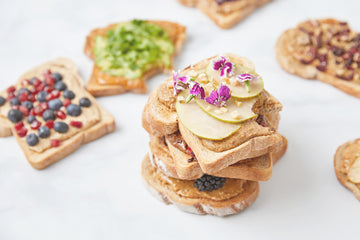"Almond blossom, sent to teach us that the spring days soon will reach us." Edwin Arnold

We are firm believers in knowing where our food comes from. Our food system is all too often opaque, and it’s our mission to push the food industry in a positive direction by being transparent. We deliberately seek grower partners with a similar philosophy, which is one of the many reasons we love our almond supplier, Treehouse.
Why Treehouse Almonds?
When we started working on the first Big Spoon Roasters recipes in fall 2010, we were focused on peanut-based nut butters, but our love of almonds inspired a 2-year-long hunt for the world’s best almonds for almond butter. We called dozens of almond orchards, spoke with almond grower associations, and sourced close to thirty samples of different varieties and sub-varieties from all over California (arguably the world’s best almond-growing region). When we tasted the unmistakable, naturally sweet and crunchy Mission variety, our search for the best almonds was immediately over.
Located in the fertile, Mediterranean-like climate of the San Joaquin Valley, Treehouse shares our commitments to quality and sustainability without compromise. Sourcing almonds exclusively from their own painstakingly tended orchards and a select few family farms in the area allows them to maintain strict standards for almond quality and environmental impact. These standards include water-saving micro-irrigation systems, solar-powered irrigation, and technology-based field management systems that eliminate water waste by gathering real-time soil, moisture, and weather data.
Bee-Friendly Farming
Treehouse is a certified Bee-Friendly Farm and a member of the Pollinator Partnership. They are committed to raising bee-health awareness and protecting pollinators through sustainable agricultural practices. Pollinators provide 1 in 3 bites of the food we eat, and they are in jeopardy. By following the principles outlined by the Pollinator Partnership, such as designating 3-6% of their land to nutritious foraging land for bees and practicing Integrated Pest Management to eliminate the use of chemicals, Treehouse is doing their part to combat pollinator devastation.
The holistic approach codified by the Pollinator Partnership promotes a prevention-first philosophy. Growers implement tactics that make their crops more resilient to pest pressure and/or actions that catch and remove pest problems early. In response to the potential risk of harmful pesticides on bee and pollinator health, the Pollinator Partnership standards prohibit use of these chemicals. The bee-friendly certification also requires that growers avoid use of some fungicides during the crop bloom period. While legally allowed during bloom, these fungicides have been linked with a variety of health issues for bee health.
Delicious Ingredients Make Delicious Food
In addition to sustainable practices, Treehouse also happens to grow some of the most delicious almonds we’ve ever tasted. We are proud to feature their heirloom Mission variety almonds in our almond-based nut butters and bars.
More about Mission variety almonds: The heirloom Mission variety almond, discovered in Texas in 1891, derives from a single chance seedling. Literally a late bloomer with smaller, denser buds and shorter, darker kernels than more popular and “attractive” varieties such as Nonpareil, Mission almonds like a longer, slower roast time and offer a deeper, more concentrated flavor.
Steam, Not Chemical Pasteurization
By law, unless sold at an almond grower’s farm stand with a maximum of 100 pounds per customer sold, almonds grown in the U.S. must undergo some form of pasteurization. This is a good thing, as it greatly increases food safety. However, a lot of conventional (not certified organic) almonds are treated with PPO, or propylene oxide. This is a potentially toxic substance that you want to avoid.
Our heirloom Mission almonds from Treehouse are steam pasteurized and contain no PPO. Furthermore, Treehouse is one of the few Certified Pollinator Friendly almond farms in the world (see above). This means gentle, renewable farming practices without the use of toxins. Also, Mission almonds like a more arid climate, so they are less likely to be in regions with more pests.
All of our ingredients are sourced from local and like-minded producers we trust who share our dedication to quality, sustainability, and transparency. Some of our producer-partners are certified organic, some are in transition to organic or operate farms that grow both certified and non-certified acreage, and some like Treehouse have other certifications but are not pursuing organic certification. Therefore, we treat each relationship as uniquely as the ingredients themselves, to ensure our sourcing practices continue to be the best for everyone involved.

